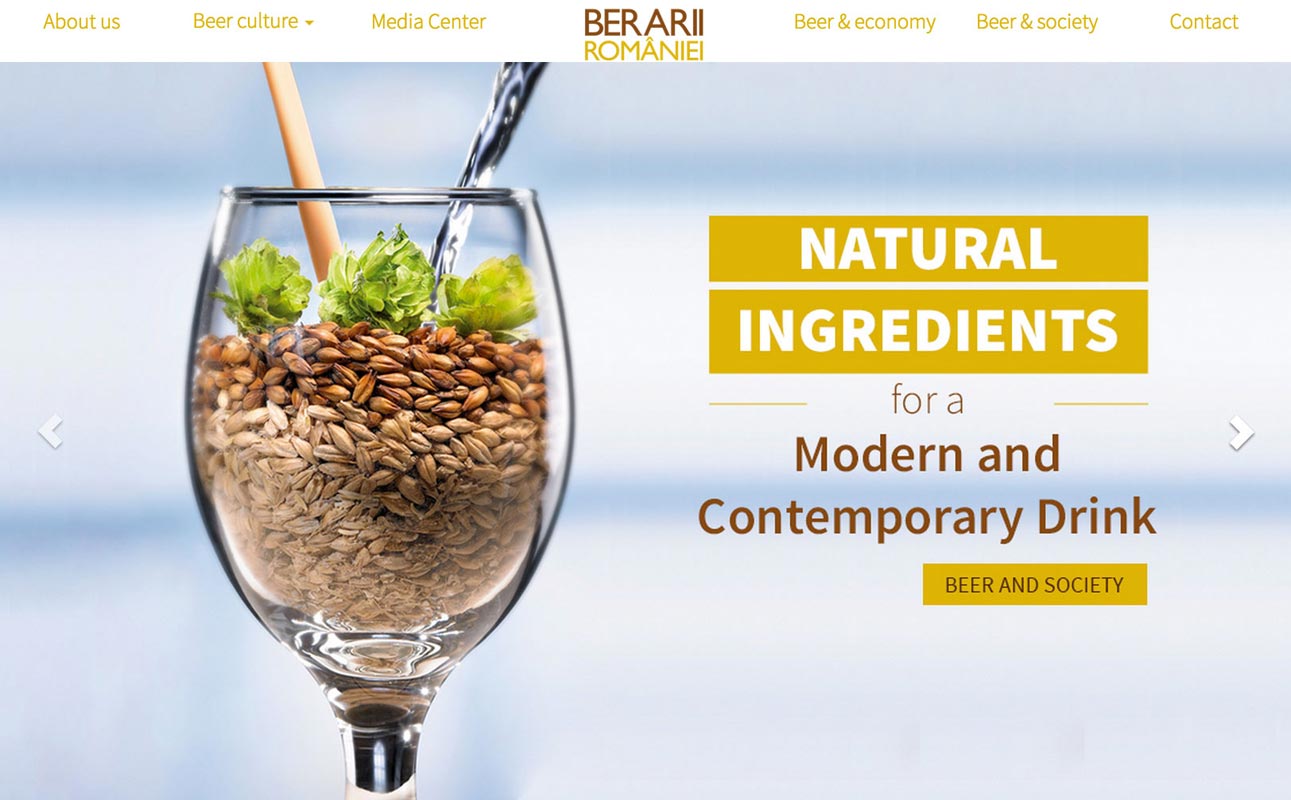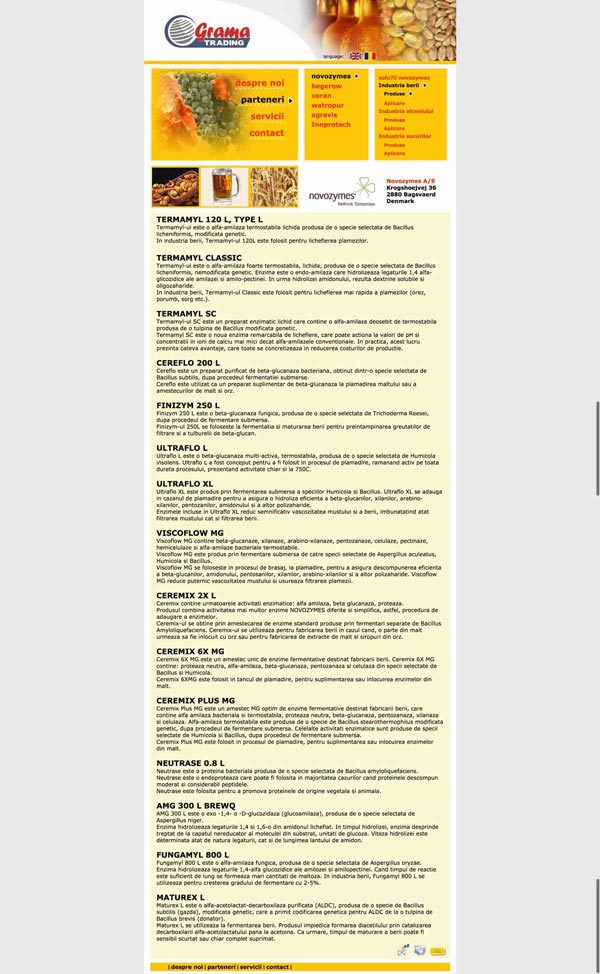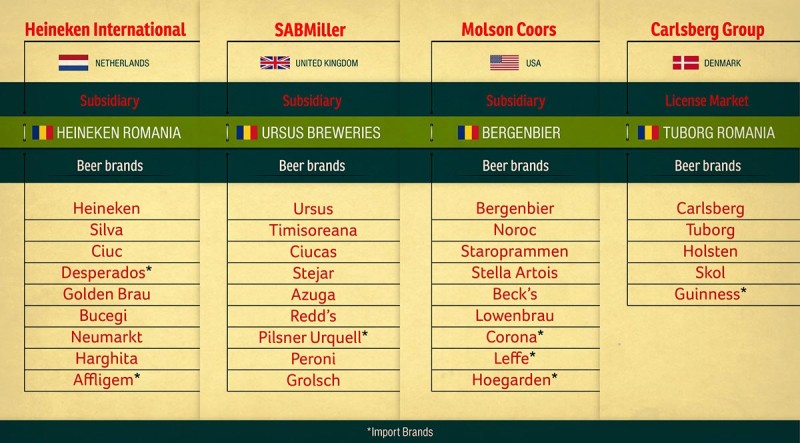These enzymes are used discreetly, without the knowledge of the consumer and unregulated by Romanian authorities. It’s not clear how many beers exploit this biotechnology due to weak labeling and reporting laws, and the refusal of commercial beer producers to acknowledge using industrial enzymes.
But interviews with former brewery employees and documents obtained from industry insiders suggest that all major multinational beer producers operating in Romania – Heineken Romania, Ursus Breweries, Bergenbier and Tuborg Romania – use these enzymes to brew their beers. Anecdotal evidence suggests the practice is not limited to Romania and may be widespread in Eastern Europe.
For example, lager beers typically brew at colder temperatures at which yeast acts more slowly, thus giving the beer its distinct taste. Traditional methods take from 12 to 48 days to brew. Enzymes help make it possible to brew a lager beer in as little as a few days.
In another example, traditional beers use malted (partially germinated) barley, which develops natural sugars. Industrial enzymes allow brewers to substitute almost any unmalted and typically cheaper grain, including corn, rice or sorghum.
The upshot is that beer drinkers have no way of knowing that their Eastern European beer with a fancy European label may have been brewed very differently from its counterpart in another country.
The Rise of Romania’s Multinational Beer Imperium
As recently as 2002, more than 50 independent breweries made beer in Romania according to a report by the Romanian Competition Council. But competition in the beer market is stiff and brewers worldwide are consolidating to benefit from the economies of scale. Over the last decade, through multinational acquisitions, consolidations and the bankruptcy of microbreweries that could no longer compete, the number of independent breweries in Romania has shrunk to only seven.
In 2016, the Romanian market is dominated by four multinational brewing companies: Heineken Romania SA, a subsidiary of Heineken International; Ursus Breweries SA, a subsidiary of SABMiller; Bergenbier SA, a subsidiary of Molson Coors; and United Romanian Breweries Bereprod SRL (Tuborg Romania), a licensee of The Carlsberg Group.
Together the four produce or distribute more than 30 brands of beer in Romania. Most of the international brands are brewed on Romanian soil. Nearly every Romanian bar and restaurant has a contract or “gentlemen’s agreement” with a multinational distributor, ensuring their customers drink beers brewed or distributed by a single multinational.
What’s inside these multinational beers, sold as natural, premium or traditionally brewed, despite potentially using enzymes that alter the character of the beer or accelerate the brewing process, is only known to the beer producers.
Romanian Multinational Brewers: A Case Study in Additives, Industrial Brewing Enzymes and Opacity
 A screenshot from the homepage of The Brewers of Romania Association, a group that represents the interests of Romania’s largest commercial Brewers, including Heineken Romania, Ursus Breweries, Bergenbier and United Romanian Breweries Bereprod (Tuborg Romania).In press materials and in online statements, Romania’s multinational beer companies promote the following:
A screenshot from the homepage of The Brewers of Romania Association, a group that represents the interests of Romania’s largest commercial Brewers, including Heineken Romania, Ursus Breweries, Bergenbier and United Romanian Breweries Bereprod (Tuborg Romania).In press materials and in online statements, Romania’s multinational beer companies promote the following:
“The brewing process has always been based on a very simple principle: the natural fermentation of sugars and the extraction of malted grains with hot water,” says the Brewers of Romania Association, a group that represents the interests of Romania’s largest breweries, in its 2015 Annual Report. Daniel Constantin, the former Romanian Minister of Agriculture, adds “beer is a noble product, brewed from natural ingredients and a source of joy to millions of Romanian consumers.”
But interviews with brewery employees and industry insiders tell a different story.
A former senior-level employee from Ursus Breweries (SABMiller’s subsidiary in Romania) who spoke on the condition of anonymity described a flawed brewing culture, where additives, chemicals and other products were frequently added to beer.
This employee said that if you ask a beer company what is in its beer, the brewer will tell you it is all natural ingredients.
“That’s the ‘official’ story,” he said.
However, “small tricks are done very quietly,” he said, adding that it is a very delicate subject for the beer companies because they don’t want consumers to know.
Brewing beer is a science dependent on the quality of the raw materials that arrive at the brewery each season. Quality varies and can be poor. Or, sometimes, mistakes are made in the brewing process that could cost a whole tank of beer if not remedied.
“When you are pressed, the peak [of the season] is here, you need to deliver and you have in the tank some improper beer you need to do something…
“What can I do? I add some additives. I ask for approval from my boss and I will do it. I am not very sure as a brewer what will happen with that specific beer, and what will happen if you drink it. Maybe you will have a headache and all is fine. They say, ‘You…how much you drank? Five beers? Oh... it’s too much, only three.’”
The former Ursus employee also described the use of inhibitors (traditionally used to control foam) and other additives to manage aroma.
A similar account was provided by a former employee of Heineken Romania (Heineken International’s Romanian subsidiary) who also spoke on the condition of anonymity. The employee mentioned the use of PVPP (a stabilizer) and tetrahop (a modified hop extract).
The employee also singled out the practice of using “exogenous,” sometimes called industrial enzymes, in the brewing process.
“Fungamyl, Ceremix 6X MG or Filtrase,” he said, were just a few of the exogenous enzymes used. (P6D)
Fungamyl and Ceremix are industrial enzymes produced by a Danish biotech company called Novozymes. Fungamyl increases starch breakdown to produce higher alcohol output while Ceremix improves beers produced with unmalted raw materials.
Another former Heineken Romania employee interviewed confirmed the use of industrial enzymes and said the principle aim of brewing many of the beers in the factory was first quantity, and after that quality. Industrial enzymes helped achieve this at less cost.
“You can take bad quality [raw ingredients], which of course you bought for a cheap price. And with the help of these enzymes you can obtain a better quality and higher quantity.”
And you can get it faster. Traditional brewing times for lager type beers (most beers in Romania fall into the lager category) typically range from two to seven weeks.
Especially in the summer, the employee said, when demand for beer is high, beers that in the winter took 16 days to brew were produced in as little as five days.
Heineken Romania’s website says they brew their beer in between 12 and 39 days.
At one point in 2008, “we tested making a beer in one day,” said the other employee.
Asked whether shorter brewing durations had any perverse effects, the former employee responded, “When a child is born in nine months, it has every chance to be healthy. But when a child is born in only seven months…”
OCCRP reporters were not able to speak with any current or former factory employees from Tuborg Romania (Carlsberg’s licensee in Romania) or Bergenbier SA (Molson Coors subsidiary in Romania). However, both a domestic distributor and an international producer of industrial brewing enzymes confirmed their ubiquity in Romania.
The website of Grama Trading, a food and beverage company that sells industrial brewing enzymes in Romania, says that they collaborate with all four subsidiaries of licensees of the multinational breweries: Heineken Romania, Bergenbier, Tuborg Romania and Ursus. Contacted by OCCRP to confirm the site’s claims, Sales Manager at Grama Trading Marius Toboșaru said, “That’s a question which sincerely I cannot respond to because it’s related to my job and the secrets of fabrication.” He then said he collaborates with the big beer companies in Romania.
Debbie Spillane, the corporate press officer for Novozymes, the Denmark-based biotech company that is one of the leading beer enzyme producers in the world and active in the Romanian beer market, wrote by email, “Romania has a high concentration of consolidated/international brewing players - Molson Coors (previously AB-InBev and StarBev), Heineken, and SABMiller - accounting for largest production volume. The Romanian brewing industry utilizes enzymes for brewing purposes for many different reasons varying from functionality, for example, developing light beers, using local raw materials, or ensuring stability.”
Industrial Enzymes: A Romanian Anomaly or Global Phenomenon?
Globally, the beer industry is secretive. Neither the United States nor most of Europe require beer companies to disclose ingredients such as additives and exogenous enzymes to consumers. Given the opacity of the industry, and the general unwillingness of commercial breweries to reveal how they make their beer, it’s not possible to say how widely used exogenous enzymes might be in the US and Europe.
However, there is some evidence that exogenous enzymes may be more widely used in third-world and developing beer markets.
Spillane from Novozymes wrote that enzyme producers make beer accessible to regions where low-income earners might not otherwise have access to or be able to afford beer.
In Germany, industrial brewing enzymes and similar additives are prohibited due to the Provisional German Beer Law of 1993, the successor to the 1526 “Reinheitsgebot,” or German Beer Purity Law which originally limited beer ingredients to water, malted barley, hops and yeast.
Enzymes are not popular in the United States. “There is a pervasive resistance of the brewers in North America to use enzymes. It is not the norm and only occurs if there is a special target not achievable by any other means,” says brewing expert Dr. Charles Bamforth, the Anheuser-Busch Endowed Professor of Malting and Brewing Sciences at UC Davis, and the President of the Institute of Brewing and Distilling.
Bamforth said US brewers might use exogenous enzymes in specific situations, for example, to produce zero-carb beer or gluten-free beer. But in general, he said, they are not used to lower costs, accelerate the brewing process or brew with non-traditional ingredients.
Additionally, American brewers need special permission from the Alcohol and Tobacco Tax and Trade Bureau (TTB) to use most brewing enzymes. Chris Swersey, the Technical Brewing Projects Manager at the Brewers Association, said if a US brewer wishes to use brewing enzymes not approved on TTB’s public list, they must apply for permission with a “statement of process,” which the TTB can either approve or deny.
The TTB did not respond to multiple requests regarding its procedures, including how often such permissions are sought, approved, or rejected.
In the European Union (EU), industrial enzymes are not yet regulated. The EU does not yet have a list of enzymes deemed safe and acceptable across EU borders. Said Jan Op Gen Oorth, a spokesman for the European Food Safety Authority, “Most enzymes are processing aids (PA). PAs are not yet harmonized in the EU, but national law applies.”
In Romania as well as many other EU countries, no national laws specifically regulate enzyme use, nor is there a list of enzymes deemed acceptable and safe. The Romanian National Authority for Veterinary and Food Safety (ANSVSA), the institution tasked with ensuring the safety of beer, said that since industrial enzymes are not considered ingredients, beer producers need not report any industrial enzymes contained in their beers. ANSVSA said it’s likely no Romanian government agency is provided a list of industrial enzymes added to commercial beers.
When a new beer is introduced on the Romanian market, it undergoes an initial inspection. After that, no Romanian agency checks to see if the raw ingredients voluntarily listed on a label match the contents of the beer.
Nor do agencies verify whether industrial enzymes are being used at the recommended dosages that are generally considered safe. ANSVSA says that it ensures the safety of beer according to HACCP (Hazard Analysis Critical Control Point) principles, including the safety of the water, and also tests for safe levels of tin and radiation.
Food enzymes are generally considered safe and non-toxic. However, according to the EU, “the food enzyme industry is continually striving to develop improved technology resulting in the development of food enzymes which became through the years more complex and sophisticated. There could be some potential hazards arising from their chemical nature and source such as allergenicity, activity-related toxicity, residual microbiological activity, and chemical toxicity.”
Sebastian Mergel, President of the Global Association of Craft Beer Brewers, said enzymes save money, and he doesn’t have a problem with breweries using enzymes or even PVP, with one caveat.
“I think it’s important that the consumer knows it. You have to be transparent on the label…It should be written down on the label.”
Bamforth, the US brewing expert, said enzymes are a sensible way to improve beer and to equalize differences from batch to batch.
However, “When enzyme companies are saying, ‘Hey you can do things in a totally different way, you can use for example raw (unmalted) barley.’ Well you won’t get the same beer, and therefore I cannot support that.”
Silence From The Multinational Beer Companies
For more than six months, OCCRP repeatedly requested interviews from the four major Romanian producers: Ursus Breweries, Bergenbier SA, Heineken Romania and Tuborg Romania. None of their representatives responded to these requests, nor did they reply to emailed questions about their use of industrial enzymes and additives.
Molson Coors, Bergenbier’s parent company, also did not respond to questions sent by email.
Peter Hammarstedt, Carlsberg International’s Managing Director of Export, License and Duty Free, who oversees Carlsberg’s licensee in Romania, said he would check on the presence of industrial enzymes in Tuborg Romania beers, but did not respond to follow-up emails.
A spokesperson for Heineken International, Marie-Christine van't Hullenaar, when asked specifically about processing aides and enzymes in Heineken beer, responded by email that “Heineken beer is brewed using the original recipe that dates back to 1873. We consistently use this one recipe around the world to brew Heineken beer.” She added that Heineken Romania is the owner of the recipes of the local beer brands, but did not address exogenous enzymes.
Emily Hamburger, a press representative for SABMiller, Ursus’ parent company, said she would not provide assistance if this story involved a discussion of the brewing enzymes industry.
Nearly a year after contacting the multinational beer producers and their Romanian subsidiaries, OCCRP emailed other Eastern European subsidiaries or distributers of SABMiller, Heineken International, Carlsberg Group, Molson Coors and Anheuser-Busch InBev across Eastern Europe: Hungary, Bulgaria, Moldova, Ukraine, Poland and Serbia, with specific questions about their use of exogenous enzymes. Only Heineken Serbia and Kompania Piwowarska (SABMiller’s Polish subsidiary) replied.
A statement from Heineken Serbia seemingly acknowledges their use of exogenous enzymes.
“Beer can be brewed using many cereals including malted barley, unmalted barley, wheat, maize, rice and sorghum – sometimes in combination with each other too. Additional enzymes can be used for some of our products in line with the different specification of their recipes.” (read the full statement here).
Conversely, Joanna Kwiatkowska, a representative of Kompania Piwowarska, denied using exogenous enzymes.
“Using exogenous enzymes is against SABMiller Brewing Policy as we believe that in most cases these are unnecessary when the brewing process is managed properly, moreover we believe that using exogenous enzymes is a shortcut often used for covering brewing quality problems.”
What are ‘Industrial’ or Exogenous Brewing Enzymes?
From a scientific perspective, “enzymes are proteins with active centers which catalyze a specific reaction,” wrote Spillane in an email.
“At Novozymes, industrial enzymes are produced using a process called submerged fermentation. This involves growing carefully the carefully selected microorganisms (bacteria and fungi) in closed vessels containing a rich broth of nutrients (the fermentation medium) and a high concentration of oxygen (aerobic conditions). As the microorganisms break down the nutrients, they produce the desired enzymes.”
Industrial enzymes are typically not classified as additives or ingredients because, if used in prescribed dosages and deactivated properly, after they perform their function they are inactive and largely undetectable in the final product.
Industrial enzymes can be used in many steps of the brewing process, from ‘Raw Material Optimization’ and ‘Cost Effective Cereal Cooking’ (Ultraflo and Termamyl are recommended by Novozymes) to Fermentation and Diacetyl control (try Neutrase and Maturex). Some are made by submerging microorganisms and extracting the enzymes, while others are produced by the submerged fermentation of a genetically modified microorganism (the extracted enzyme protein is not genetically modified).
Fall of the Romanian Microbreweries, Rise of Unmalted Grains and Enzymes
 A select list of industrial enzymes produced by Novozymes and distributed by Grama Trading, a Romanian company that specializes in products for the beverage industries. Grama Trading’s website says they collaborate with all The Big Four commercial breweries: Heineken Romania, Bergenbier, Tuborg Romania and Ursus Breweries. One reason for the prevalence of exogenous enzymes in Romania (and other developing countries) is the pervasiveness of corn and unmalted barley in Romanian beers. Traditionally, beer is composed of four ingredients: malted barley, hops, yeast and water. In Romania, fewer than one in four beers domestically produced by the big four brewers are limited to these traditional ingredients.
A select list of industrial enzymes produced by Novozymes and distributed by Grama Trading, a Romanian company that specializes in products for the beverage industries. Grama Trading’s website says they collaborate with all The Big Four commercial breweries: Heineken Romania, Bergenbier, Tuborg Romania and Ursus Breweries. One reason for the prevalence of exogenous enzymes in Romania (and other developing countries) is the pervasiveness of corn and unmalted barley in Romanian beers. Traditionally, beer is composed of four ingredients: malted barley, hops, yeast and water. In Romania, fewer than one in four beers domestically produced by the big four brewers are limited to these traditional ingredients.
Instead, the commercial beers feature a high concentration of unmalted ingredients that are generally cheaper than traditional malted barley, but also depend on industrial enzymes to help generate consistent yields and tastes. The former Heineken employee said, for example, that any beer containing corn that they made included a cocktail of industrial enzymes.
Another explanation why industrial enzymes are likely more prevalent in Romania, Eastern Europe and other developing countries is because small, independent microbreweries who often shun brewing with industrial enzymes, and rely on more natural processes, are scarce.
According to the latest statistics from the Brewers of Europe, in 2014 Romania had only seven microbreweries (better than Malta and Turkey, which each have none, but well behind the UK’s 1,414). At the same time, Romania is the 9th biggest producer of beer and the 8th largest beer-consuming nation per capita in Europe.
A few independent microbreweries in Romania such as Clinica de Bere, Zaganu, Csíki Sör, Ground Zero and Sikaru compete with the big factories. Those contacted lamented the difficulty of accessing bars and restaurants in Romania.
Marius Mircea, Managing Director of a microbrewery in Timisoara called Clinica de Bere said the difference between his and the multinational breweries is the quality of his ingredients and the time he spends brewing his beers.
“From what I know the biggest companies do, they have shortened the process from 2 weeks to 5 days…There are beers on the market that are cheaper than water, of course you can’t expect them to have solid ingredients.”
He said he knew nothing of industrial enzymes or other additives because he doesn’t use them.
But Leonard Andras, owner of Csíki Sör, a small brewery in Transylvania, said he is very familiar with industrial enzymes, but does not use them on principle.
“It’s no longer beer when you use enzymes.” He said he regularly receives offers from enzyme distributors asking him to consider using their products.
The owner of another microbrewery recalled being contacted by an enzyme company. When he told the salesman he wasn’t interested, the salesman replied, “How do you make any money?”
Transparency and Beer’s Endgame
Of the dozens of Romanians questioned about exogenous enzymes in their beer, none had ever heard of the practice. Romanian consumers get no information on the beer fabrication process, even if it includes enzymes extracted from genetically modified microorganisms.
Anheuser-Busch InBev, the world’s largest beer producer, recently announced that it plans to take over SABMiller, the world’s second largest producer. According to a statement made by SABMiller’s’ Chairman Jan du Plessis, “SABMiller has an unmatched footprint in fast-growing developing markets,” meaning there’s reason to assume industrial enzymes will play a larger part in beer’s future.
If so, then consumers in developing markets (and even parts of the EU) who drink beer might want to know that their beer is the product of biotechnology, a biotechnology that is shunned in some parts of the world, and part of a cost-saving secret the multinational beer companies don’t want to admit.






